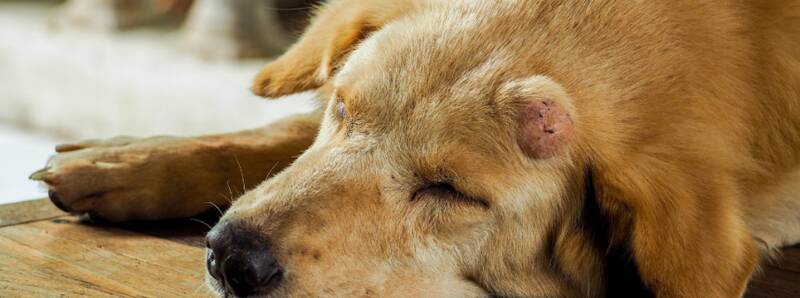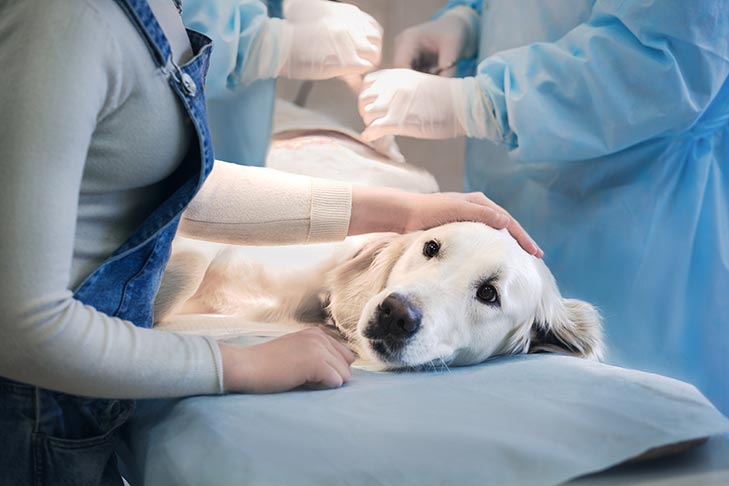Loyal, charming, outgoing, bright, affectionate, cuddly, kid-friendly, irresistible… These are just some of the adjectives people use to describe their Golden Retrievers. And let’s admit it, after years of working with many pet parents, we have never met a Goldie that was less than wonderful.
So big are the hearts of these fur babies, but so short is their lifespan. Our dogs already have shorter lives than us to begin with, but Golden Retrievers, face a huge challenge in their life: Cancer. These loyal companions unfortunately carry a higher risk of developing this devastating disease. But knowledge is power, and understanding Golden Retriever cancer symptoms is the first step in giving our pets the best chance at a long, healthy life.
How Common is Cancer in Golden Retriever?

Let’s begin with some horrifying news: According to studies, approximately 60% of Goldies will develop cancer after the age of 10. That’s a whopping number compared to other dogs, which sits at around 25%.
Perhaps you are wondering, “Why my Golden?”. As a fellow Goldie owner, I, too, was frustrated. All dogs may develop cancer, but Golden has the highest probability. After doing some research on this heartbreaking fact, I found out the factors that contribute to this:
- Genetics: Golden Retrievers have a genetic predisposition to certain types of cancer. It’s like they have inherited a slightly faulty “cancer protection” system.
- Breed history: The modern Golden Retriever breed descends from a relatively small number of founding dogs. This limited gene pool has inadvertently concentrated some cancer-causing genes.
- Environmental factors: While this affects all dogs, some researchers believe that Goldens might be more sensitive to environmental toxins. Things like pesticides, household chemicals, and even certain preservatives in food could potentially have a bigger impact on your pup.
- Body type: Goldens are prone to obesity, which has been linked to increased cancer risk in dogs (just like in humans).
Popular Types of Cancer in Golden Retrievers

Does that mean your furry friend is doomed? Well, it doesn’t! Our team has seen many Goldies living long and happy lives without ever facing cancer. However, it means that every pet parent out there should be extra cautious. First, let’s get you familiar with the most common cancers in Golden:
Bone Cancer (Osteosarcoma)
Bone cancer, or Osteosarcoma, is an aggressive bone tumor that frequently affects large breed dogs like Golden Retrievers. It can occur in any bone in the body but is mostly seen along the legs.
The primary symptom of osteosarcoma is lameness or limping, which can be sudden or gradual. You might notice your Golden Retriever favoring one leg or avoiding putting weight on a particular limb. As the cancer progresses, you may observe swelling in the affected area, which can be firm to the touch and may increase in size over time.
Pain is another significant indicator of bone cancer. Your dog may show signs of discomfort, especially when the affected area is touched. They might also become less active, avoiding activities they once enjoyed, such as running or climbing stairs.
Mammary Cancer
Mammary cancer is a concern primarily for female Golden Retrievers, especially those who haven’t been spayed or were spayed later in life. These tumors develop in the mammary glands and can be either benign or malignant.
The most noticeable sign of mammary cancer is the presence of lumps or masses in the mammary glands. These can range from soft to hard in texture and may increase in size over time. It’s important to note that not all mammary tumors are cancerous, but any lump should be examined by a veterinarian.
As mammary tumors grow, they can cause the skin over them to break down, leading to ulcers or open sores. These can be painful and prone to infection. In advanced cases, you might notice swelling in nearby lymph nodes, particularly in the armpits or groin area, indicating that the cancer has begun to spread.
Lymphoma
Lymphoma is a cancer of the lymphatic system, which plays a crucial role in the body’s immune functions. This type of cancer can affect various organs and is relatively common in Golden Retrievers.
The most common and often first noticeable sign of lymphoma is the enlargement of lymph nodes. You might feel swollen, usually painless lumps under your dog’s neck, behind their knees, or in their armpits. These swollen lymph nodes are typically symmetrical, appearing on both sides of the body.
As lymphoma progresses, it can cause systemic symptoms. Your Golden Retriever may become lethargic, showing less interest in activities they once enjoyed. They might also experience a loss of appetite, leading to noticeable weight loss. In some cases, lymphoma can cause difficulty breathing if it affects the chest area.
Lung Cancer
While less common than the other types mentioned, lung cancer can occur in Golden Retrievers. It’s often the result of metastasis from other primary tumors, meaning cancer has spread from another part of the body to the lungs.
The most prominent sign of lung cancer is a persistent, dry cough that doesn’t respond to treatment. This cough may worsen over time and could be accompanied by other respiratory symptoms.
You might notice your Golden Retriever having difficulty breathing or breathing more rapidly, even when at rest. They may also show signs of exercise intolerance, becoming winded easily during activities they previously handled with ease.
In advanced stages, lung cancer can cause more severe symptoms such as coughing up blood, loss of appetite, and significant weight loss. If you notice any of these signs, it’s crucial to seek veterinary care immediately.
Symptoms of Cancer in Golden Retrievers

Since there are various types of cancer in dogs, the symptoms also vary based on the location of the malignant tumor and the type. However, dogs at the early stages of cancer might show common signs that you should be aware of. According to Dr. Skylar Sylvester from Cornell University’s College of Veterinary Medicine, these warnings prompt a visit to the vet:
- Unusual swelling & bumps: We always advise our pet parents to groom their pets regularly, as it gives them a chance to examine their Goldies’ skin. The good news is that 85% of skin bumps in pets are not malignant, but taking your furry friend to the vet is the only way to make sure.
- Sudden energy loss: If your friendly dog suddenly becomes lethargic and lacks enthusiasm for their usual favorite activities, you should be alert. Lower energy is an early sign of illness.
- Unexplained weight loss: Unless your Golden Retriever is on a diet, sudden weight loss might signal diseases.
- Appetite loss: Your food-loving dog is turning down the meal? There are many reasons for this, from stress to serious illnesses. Unfortunately, cancer is one of them.
- Bad smell: Like humans, each dog has their scent. If your pet suddenly exudes foul odor from any part of their body, don’t overlook it. Though less common than other types, oral or anus cancer may cause this unsettling smell.
- Changes in bathroom habits: Once they have been toilet trained, Golden Retrievers never forget. If they begin urinating or defecating randomly around the house, it could be a symptom of a kidney or bowel tumor.
Which Golden Retriever Puppies Are More Prone to Cancer

While cancer can affect any Golden Retriever, certain factors may increase the risk:
- Genetic predisposition: Some Golden Retriever bloodlines may have a higher incidence of cancer. If you’re getting a puppy, ask the breeder about the cancer history in their breeding lines.
- Environmental factors: Puppies exposed to certain environmental toxins or living in areas with high pollution levels may be at increased risk.
- Early spaying/neutering: There’s an ongoing debate about the impact of early spaying/neutering on cancer risk in large breed dogs like Golden Retrievers. Some studies suggest that waiting until the dog is fully grown may reduce the risk of certain cancers.
- Diet and exercise: Puppies that maintain a healthy weight and receive proper nutrition throughout their lives may have a lower cancer risk. Make sure to find the best dog food for golden retrievers with only premium nutrients to prevent your pet from any kind of cancer.
- Immune system health: Puppies with compromised immune systems may be more susceptible to developing cancer later in life.
It’s important to note that while these factors may increase risk, they don’t guarantee a dog will develop cancer. Regular check-ups and a healthy lifestyle can help mitigate these risks.
Preventing Cancer in Golden Retrievers

While it’s not possible to prevent all cases of cancer, there are steps you can take to reduce your Golden Retriever’s risk:
Maintain a Healthy Diet
Feeding your Golden Retriever a balanced, high-quality diet is crucial for their overall health and may help reduce cancer risk. Look for dog foods that are rich in antioxidants, which can help combat free radicals in the body. Omega-3 fatty acids, found in fish oil supplements or certain dog foods, may also have cancer-fighting properties.
Avoid foods with artificial preservatives, colors, and flavors. Some studies suggest that these additives might contribute to cancer risk. Instead, opt for natural, whole-food ingredients. You might also consider adding fresh fruits and vegetables (approved for dogs) to their diet as treats.
Regular Exercise
Keeping your Golden Retriever at a healthy weight through regular exercise is essential. Obesity has been linked to an increased risk of several types of cancer in dogs. But how much exercise does a golden retriever need? Aim for at least 30 minutes of moderate exercise daily, which could include walks, swimming, or playing fetch.
Exercise not only helps maintain a healthy weight but also supports overall physical and mental health. It can boost the immune system, improve circulation, and reduce stress – all factors that may contribute to cancer prevention.
Minimize Exposure to Environmental Toxins
Reduce your dog’s exposure to potential carcinogens in the environment. This includes avoiding the use of harsh chemicals in your home and yard, such as certain pesticides and herbicides. If you smoke, do so away from your dog, as secondhand smoke can be harmful to pets as well as humans.
Be cautious about the products you use on your dog, such as flea and tick treatments. Always follow the instructions carefully and consider natural alternatives when possible. Also, be aware of any potential toxins in your dog’s toys or bedding.
Regular Veterinary Check-ups
Schedule regular check-ups with your veterinarian, ideally twice a year for adult dogs. These visits allow for early detection of any potential health issues, including cancer. During these check-ups, your vet can perform physical examinations and may recommend blood tests or other diagnostic procedures to catch any problems early.
Don’t hesitate to bring your dog in for a check-up if you notice any unusual symptoms or changes in behavior between regular visits. Early detection can significantly improve the prognosis for many types of cancer.
Consider Spaying/Neutering
Discuss the best time to spay or neuter your Golden Retriever with your veterinarian. Spaying female dogs before their first heat cycle can significantly reduce the risk of mammary cancer. However, the timing of neutering for male dogs is more controversial, as some studies suggest that early neutering might increase the risk of certain cancers in large-breed dogs.
Genetic Testing
If you’re getting a Golden Retriever puppy, consider asking the breeder about genetic testing. Some genetic tests can identify markers associated with an increased risk of certain cancers. While this doesn’t guarantee your dog will or won’t develop cancer, it can help you and your vet create a more targeted preventive care plan.
Provide Mental Stimulation
A happy, mentally stimulated dog tends to be healthier overall. Provide your Golden Retriever with plenty of toys, puzzles, and interactive play sessions. This can help reduce stress, which some studies suggest may play a role in cancer development.
Remember, while these strategies can help reduce the risk of cancer, they can’t eliminate it. Stay vigilant about your dog’s health, and don’t hesitate to consult with your veterinarian if you have any concerns.
The Final Thoughts
While the prevalence of cancer in Golden Retrievers is a sobering reality, there’s hope on the horizon. The high risk has spurred extensive research specifically focused on this beloved breed. Studies like the Golden Retriever Lifetime Study are following thousands of Goldens throughout their lives, aiming to better understand cancer risk factors, potential prevention strategies, and golden retriever cancer symptoms.
As a devoted Golden Retriever owner, your role is crucial. Stay vigilant and informed about golden retriever cancer symptoms, such as unusual lumps, persistent limping, or unexplained weight loss. Regular veterinary check-ups are your first line of defense, allowing for early detection and intervention. Maintain a healthy lifestyle for your furry friend through proper diet and exercise, and never underestimate the power of love and attention.

With years of expertise as a pet care writer, I’ve acquired a specific interest in Golden Retrievers, who are one of the most popular and beloved dog breeds. Although I do not own a Golden Retriever, my extensive study and talks with pet professionals enable me to offer useful and reliable articles for dog owners. My work on this website covers important areas such as diet, grooming, and training for Golden Retrievers. My goal is to provide readers with the information they need to keep their dogs healthy and happy.

